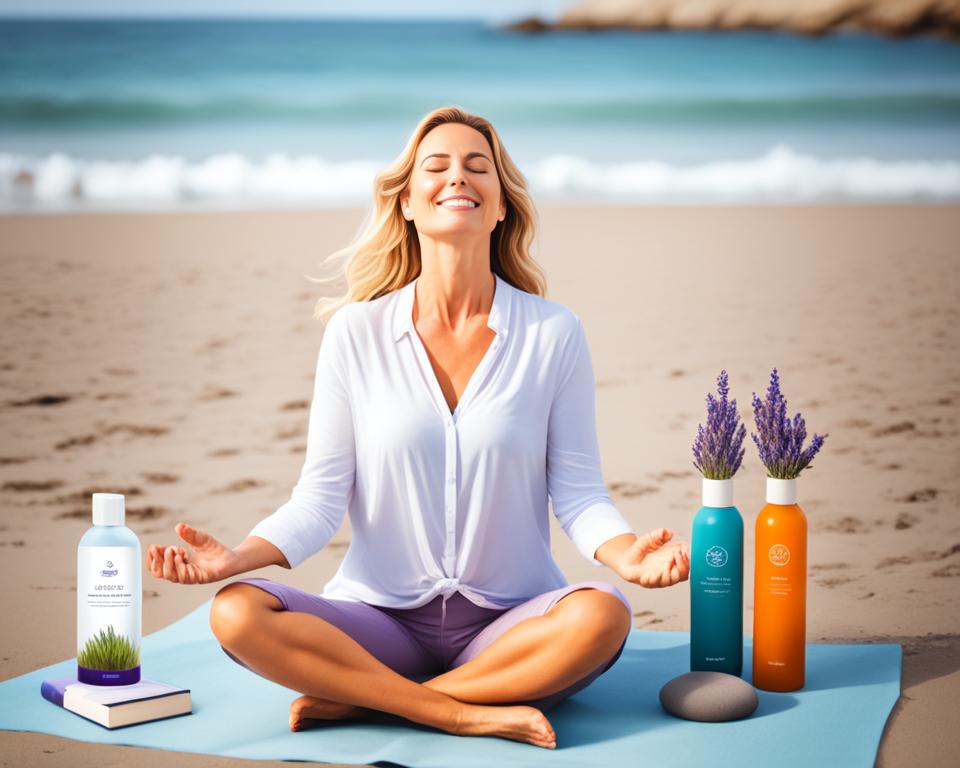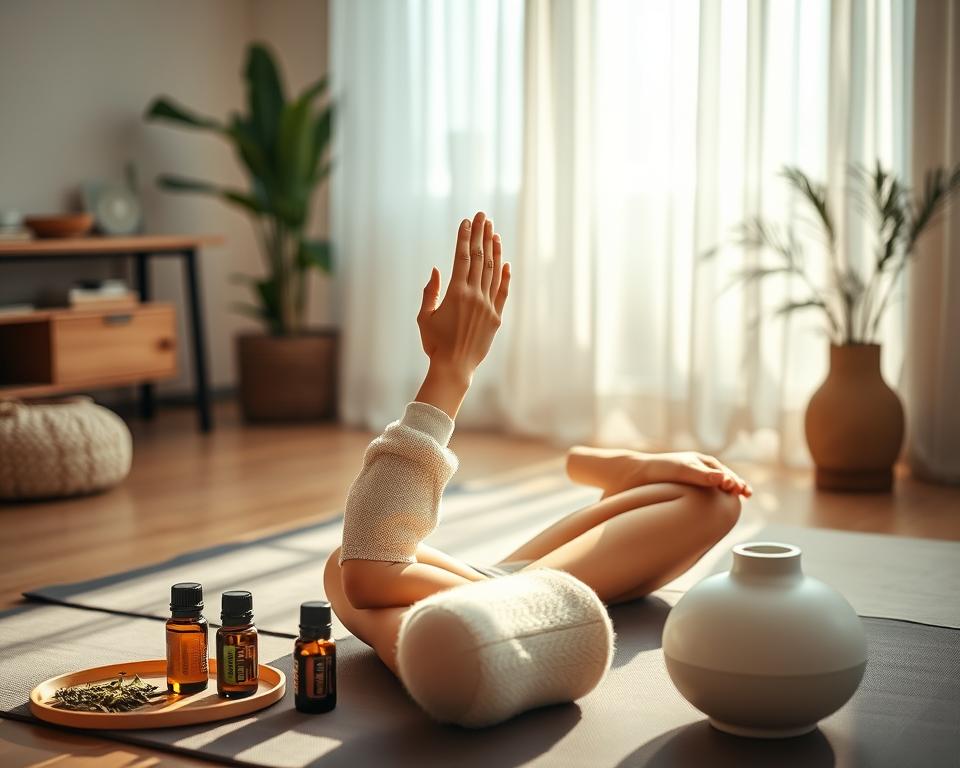In today’s fast-paced world, we often forget how crucial rest is. But rest is key to our health and happiness. It boosts our energy, makes us more productive, and helps us handle stress better.
This article looks at the different kinds of rest and how they help us. We’ll see how rest helps our bodies and minds heal. By learning about rest, we can make it a big part of our lives. This can make us feel better and live better.
Rest comes in many forms, like a good night’s sleep, a short nap, or a weekend away. Making rest a priority can lead to better health and more happiness. It helps us work better and feel more fulfilled.
Read more interesting information at ::mbp-ehime
Introduction to the Importance of Rest
In today’s fast-paced world, we often forget how vital rest and recovery are. But the importance of rest is huge. It’s key to our overall health, covering our physical, mental, and emotional sides.
Why Rest Matters for Overall Well-being
Doing activities uses up a lot of our energy. Rest and recovery help refill this energy, letting us perform well. By making rest and rejuvenation a priority, we gain many benefits. These benefits improve our why rest is good for you and our life quality.
- Improved cognitive function and focus
- Enhanced mood and emotional stability
- Increased physical strength and endurance
- Reduced stress and anxiety levels
- Faster recovery from injuries or illnesses
The importance of rest is clear. It helps our bodies and minds recharge, rejuvenate, and work at their best. By knowing how crucial rest is and adding it to our daily life, we can reach our full well-being potential. This leads to thriving in every part of our lives.
Understanding the Different Types of Rest
Rest is key to our well-being. It comes in many forms, each helping our physical, mental, and emotional health. Let’s look at the different types of rest and their benefits.
Physical Rest
Physical rest lets our bodies recover from hard work and stress. It includes sleeping, napping, or doing easy exercises. This kind of rest helps our muscles, joints, and tissues heal and get stronger.
Mental Rest
Mental rest means our minds get a break from constant thinking and stress. Activities like meditation, mindfulness, or taking a break from work help us relax. This type of rest lowers stress, improves focus, and boosts our thinking skills.
Emotional Rest
Emotional rest is about dealing with our feelings. It can be through journaling, hobbies, or being with loved ones. This kind of rest helps us manage our feelings, be more resilient, and keep a healthy balance in life.
Adding these types of rest to our daily life makes us more balanced and refreshed. Whether it’s for our body, mind, or heart, making rest a priority is crucial for our health and happiness.
| Type of Rest | Key Benefits |
|---|---|
| Physical Rest | Muscle recovery, reduced fatigue, improved energy levels |
| Mental Rest | Reduced stress and anxiety, enhanced focus and productivity |
| Emotional Rest | Improved emotional regulation, increased resilience, better overall well-being |
“Rest is not idleness, and to lie sometimes on the grass under trees on a summer’s day, listening to the murmur of the water, or watching the clouds float across the sky, is by no means a waste of time.” – John Lubbock
Physical Benefits of Rest
Rest and recovery are key for our health. Taking time to recharge helps our bodies change in big ways. This leads to better energy levels and more productivity.
One big physical benefit of rest is fixing and refreshing our muscles, tissues, and organs. While we rest, our bodies refill energy, fix tiny damages, and make our immune system stronger. This makes us feel more awake and boosts our ability to do our best.
Improved Energy Levels and Productivity
Choosing rest and recovery unlocks a lot of energy for our daily tasks. Enough rest helps us feel less tired and more ready to do things. Finding a good balance between work and rest keeps our energy steady. This way, we can do our jobs with more energy and interest.
| Benefit | Description |
|---|---|
| Muscle Repair | Rest helps our bodies fix and build back damaged muscle tissue. This makes us perform better and lowers the chance of getting hurt. |
| Immune System Boost | Rest helps our immune system work better. This means we can fight off sickness and infections more easily. |
| Hormone Regulation | Enough rest keeps our hormones balanced. Hormones like growth hormone and cortisol are important for staying healthy. |
Adding enough rest and recovery to our daily life brings many physical benefits. These benefits include more energy, doing better in our tasks, and having a stronger body. Taking care of ourselves by resting is a smart way to improve our health and reach our goals.
Mental Benefits of Rest
Rest is not just good for our bodies; it’s also great for our minds. Taking breaks helps us recharge and think better. It improves our decision-making and overall mental health. Rest helps reduce stress, boost focus, and increase creativity, making it key for a healthy life.
Reduced Stress and Anxiety
Rest helps lower stress and anxiety. When we’re always busy, our minds get too full. This can make us feel stressed out. Taking breaks and doing relaxing things can calm our minds and clear our thoughts.
Rest also stops anxiety from starting. It lets our brains recharge, helping us handle daily life better. This leads to better decisions, solving problems more easily, and feeling happier.
“Rest is not idleness, and to lie sometimes on the grass under trees on a summer’s day, listening to the murmur of the water, or watching the clouds go by, is by no means a waste of time.”
– John Lubbock
Putting rest first helps us connect better with our feelings and thoughts. This leads to a more fulfilling life. The benefits of rest for our minds are clear, making it vital for staying healthy.
Emotional Benefits of Rest
Rest is not just good for our bodies and minds. It also greatly helps our emotional well-being. Taking time to rest and rejuvenate brings us emotional balance and stability.
One key emotional benefit of rest is a better mood. When we rest, we feel more positive and resilient. This helps us handle life’s ups and downs better, making us emotionally stronger.
Rest is also key in managing stress and anxiety. Being well-rested helps us deal with life’s emotional challenges. By resting and rejuvenating, we lessen stress and anxiety’s negative effects. This leads to a healthier emotional state.
“The emotional benefits of rest are just as important as the physical ones. By prioritizing our emotional well-being, we can unlock a deeper sense of resilience and balance in our lives.”
The emotional benefits of rest are crucial for our health and happiness. Recognizing rest’s importance helps us live more emotionally fulfilling lives. It empowers us to do well in every part of our lives.
Why Rest is Good for You
In today’s fast world, we often forget how vital rest and recovery are. But rest’s health benefits are huge. Taking time to rest lets our bodies and minds heal, rejuvenate, and get stronger.
Rest Promotes Healing and Recovery
Rest is key for healing and getting better. When we rest, our bodies work on fixing damaged tissues, fighting infections, and getting back what we lost. This is super important for people getting over injuries, illnesses, or hard workouts.
Rest is also crucial for our minds and feelings. By relaxing and stepping away from daily life, we let our minds work through things, manage feelings, and lessen stress and anxiety. This makes us feel better, think clearer, and be more happy overall.
“The best bridge between despair and hope is a good night’s sleep.”
– E. Joseph Cossman
By making rest and recovery a priority, we boost our strength in body, mind, and heart. This helps us face life’s challenges with more energy and focus.
| Benefits of Rest | Impact on Health |
|---|---|
| Improved Healing and Recovery | Faster recovery from injuries, illnesses, and strenuous physical activity |
| Reduced Stress and Anxiety | Improved emotional well-being and mental clarity |
| Increased Energy and Productivity | Enhanced ability to tackle daily tasks and challenges |
| Strengthened Immune System | Greater resilience against infections and illnesses |
Consequences of Chronic Rest Deprivation
Not getting enough rest can seriously harm our health and happiness. Our bodies need rest to stay healthy. Without it, we face physical, mental, and emotional problems that affect our life quality.
One big effect of not resting enough is feeling tired all the time. This makes it hard to focus and do our best at work or in daily tasks. It can lead to burnout, making it hard to succeed.
Not resting enough also hurts our mental health. It can make us more likely to feel anxious, depressed, or have mood swings. Without enough sleep, our brains work worse. This makes everyday tasks harder.
Our bodies also suffer from not resting enough. Not sleeping well can weaken our immune system, making us more likely to get sick. It can also lead to serious health issues like heart disease, obesity, and diabetes.
| Consequence | Impact |
|---|---|
| Decreased energy and productivity | Fatigue, burnout, and reduced performance |
| Mental health issues | Increased risk of anxiety, depression, and cognitive impairment |
| Physical health problems | Weakened immune system, increased risk of chronic diseases |
Getting enough rest is very important. By understanding the risks of not resting enough, we can take steps to improve our health and happiness.
Rest and Sleep: The Perfect Duo
Rest and sleep are closely linked for our well-being. Good sleep is key to our health, helping our body, mind, and heart. Together, they keep us feeling great.
Importance of Quality Sleep
Getting enough sleep is crucial for many reasons. Our bodies fix tissues, balance hormones, and strengthen memories while we sleep. With quality sleep, we feel more energetic, think clearer, and stay in a good mood.
Not sleeping well can harm our health. It can lead to obesity, diabetes, and heart disease. So, making sure we sleep well is important for staying healthy.
| Benefits of Quality Sleep | Consequences of Sleep Deprivation |
|---|---|
|
|
By focusing on rest and good sleep, we can fully enjoy our health. These two are closely linked and important for our well-being.

Balancing Rest and Activity
Finding the right mix of rest and activity is key to feeling good and being productive. It’s like a dance, but the benefits are huge.
Rest and activity are not opposites. They help each other out for our health and performance. By mixing rest and activity in our daily life, we can reach our best and enjoy both.
Work-Life Balance: The Key to Sustainable Productivity
Getting this balance right is tough, especially with work and personal life mixing too much. This can lead to burnout and not enough rest. So, it’s important to set clear lines and focus on rest and activity balance.
- Make time for rest and fun, away from work.
- Do things that make you feel good, like exercise or being in nature.
- Don’t always be “on” – take breaks from work outside of work hours.
Optimizing Rest and Productivity
Many think rest and productivity can’t go together. But, taking breaks can actually make us more productive. Rest helps our minds and bodies, so we come back to work with more focus and energy.
| Activity | Rest |
|---|---|
| Focused work and task completion | Breaks, naps, and leisure activities |
| Creativity and problem-solving | Meditation and mindfulness practices |
| Physical exercise and fitness | Restorative sleep and recovery |
By finding the right balance, we can reach our full potential, feel better, and keep a good rest and activity balance.
“The time to relax is when you don’t have time for it.” – Sydney J. Harris
Rest and Productivity: Unlocking Your Potential
In today’s fast-paced world, it’s easy to overlook rest in our drive for productivity. But research shows that rest is key to reaching our full potential. By understanding how rest affects our performance, we can use our time and energy better.
Rest boosts our brain power, creativity, and decision-making. When we rest, our minds and bodies recharge. This makes us ready to solve complex problems, think creatively, and make smart choices. This leads to more productivity and feeling accomplished.
Rest also has long-term benefits. Not getting enough rest can make us less motivated, hurt our problem-solving skills, and increase the risk of burnout. Finding the right balance between work and rest helps us maintain a strong work ethic over time.
To reach your full potential, add strategic rest to your daily life. Try different rest methods like short naps, mindfulness, or regular breaks. Prioritizing rest and recovery helps unlock your productivity and leads to success in all life areas.
| Rest and Productivity Indicators | Before Incorporating Rest | After Incorporating Rest |
|---|---|---|
| Cognitive Function | Declined | Improved |
| Creativity | Stagnant | Enhanced |
| Decision-Making Abilities | Impaired | Sharpened |
| Motivation | Decreased | Increased |
| Risk of Burnout | Higher | Lower |
The table shows how rest can greatly improve productivity. By focusing on rest and recovery, we see better cognitive function, creativity, decision-making, motivation, and well-being. This leads to more productivity and success.
“The best way to get something done is to begin. But the best way to begin is often to rest.”
– Pico Iyer
As author Pico Iyer points out, rest is essential, not a luxury. By making rest a part of our daily life, we boost creativity, sharpen our decisions, and increase productivity in every area.
Incorporating Rest into Your Daily Routine
Getting enough rest is key to staying healthy and feeling good. By adjusting our daily plans, we can make sure we rest well. Here are some easy tips to add more rest to your day.
Practical Tips for Getting Enough Rest
One great way to focus on rest is by taking regular breaks. Try to take a 10-15 minute break every few hours. You can stretch, meditate, or just step away from work. Also, a short nap during lunch can help you recharge.
It’s important to have a regular sleep schedule. Try to sleep and wake up at the same time every day, even on weekends. This helps your body clock stay in sync. Before bed, avoid screens and do something calming to signal sleep time.
- Schedule regular breaks throughout the day
- Incorporate a short power nap during your lunch break
- Establish a consistent sleep routine
- Avoid screens and stimulating activities before bedtime
- Create a relaxing bedtime ritual
Practices like meditation or deep breathing can also help you relax. Spend a few minutes each day doing these activities. They can lower stress, improve focus, and make you feel better overall.
| Tip | Description |
|---|---|
| Schedule Regular Breaks | Take 10-15 minute breaks every couple of hours to stretch, meditate, or step away from your workspace. |
| Establish a Consistent Sleep Routine | Go to bed and wake up at the same time each day, even on weekends, to regulate your body’s internal clock. |
| Incorporate Mindfulness Practices | Engage in meditation or deep breathing exercises to reduce stress and enhance your overall sense of well-being. |
By using these tips in your daily life, you can make your routine more balanced and restful. This ensures you get the rest and refreshment your body and mind need to do well.
Rest and Mindfulness: A Powerful Combination
Combining rest and mindfulness can change how you feel overall. Adding mindfulness practices like meditation to your rest can make it more powerful. This leads to a deeper sense of balance and feeling refreshed.
Mindfulness means being fully in the moment. It makes your rest better. With mindful breathing, visualization, or body scans, you can stop worrying. This lets your body and mind fully relax and recharge.
- Mindfulness techniques, like meditation, help you relax deeply. This lets your body refill and recharge.
- Together, rest and mindfulness give you both physical and mental benefits. You feel better overall.
- Practicing mindfulness practices while resting improves sleep, lowers stress and anxiety, and boosts your thinking skills.
Adding rest and mindfulness to your daily life can change everything. It helps you feel more balanced and refreshed. Start using this powerful mix to enjoy the deep benefits of rest and rejuvenation.

Rest and Rejuvenation: Recharging Your Batteries
Rest and rejuvenation are key to a healthy life. Letting our bodies and minds recharge helps us restore and revitalize. Relaxation techniques are a great way to get the rest we need.
Relaxation Techniques for Optimal Rest
Deep breathing and progressive muscle relaxation are just a few strategies to help you rest. Adding these to your daily life can boost your well-being. It also makes you more productive and clear-headed.
Deep breathing is a strong way to relax. Slow, deep breaths start the body’s relaxation response. This lowers stress and brings calm. Progressive muscle relaxation is another good method. It involves tensing and then relaxing muscle groups. This helps release tension and leads to deep relaxation.
Visualization is also great for rest and rejuvenation. Imagine a peaceful scene to calm your mind. This reduces anxiety and brings tranquility. Using these techniques regularly helps you recharge. You’ll feel more energized and focused in your daily life.
| Relaxation Technique | Benefits |
|---|---|
| Deep Breathing | Triggers the body’s relaxation response, lowers stress levels, promotes calm |
| Progressive Muscle Relaxation | Releases muscle tension, fosters a deep state of relaxation |
| Visualization | Transports the mind to a calming environment, reduces anxiety, promotes tranquility |
Using relaxation techniques daily brings big benefits. It leads to rest and rejuvenation. This helps you reach your full potential and improves your rest and recovery.
Rest and Exercise: Striking the Right Balance
Finding the right balance between rest and exercise is key for good health and happiness. Exercise keeps us fit and healthy. But, we also need enough rest to recover and stay balanced.
Rest and exercise work together. Exercise makes our bodies stronger, increases endurance, and keeps our hearts healthy. But, we need rest and recovery to refill our energy, fix muscles, and adjust to exercise’s stress.
Getting the right mix of rest and physical activity brings many benefits. These include:
- Improved overall fitness and performance
- Enhanced muscle growth and recovery
- Reduced risk of injuries and burnout
- Increased energy levels and mental clarity
To find this balance, listen to your body. Mix different exercises in intensity and length with enough rest. This approach helps you reach your best and stay healthy over time.
| Element | Importance | Tips |
|---|---|---|
| Rest | Allows the body to recharge, repair, and adapt to physical stresses. | Aim for 7-9 hours of quality sleep per night. Incorporate active recovery activities like light stretching or yoga. |
| Exercise | Strengthens the body, improves cardiovascular health, and boosts overall fitness. | Engage in a variety of exercises, such as strength training, cardio, and flexibility workouts, to target different muscle groups. |
Understanding the balance between rest and exercise helps you use your body and mind fully. This leads to better physical and mental health.
“The key to a healthy, active lifestyle is finding the right balance between physical activity and adequate rest and recovery.”
Overcoming Barriers to Rest
Finding time for rest in our busy lives is tough, but it’s key for our health. We need to spot and tackle the barriers to rest and challenges to rest. This is the first step to making rest a top priority in self-care.
One big barrier to rest is feeling like we must always be productive. Many think resting means we’re lazy. But, studies prove that regular rest and relaxation can make us more productive, creative, and perform better at work.
- Busy lives and heavy workloads make it hard to find time for rest.
- Worrying about falling behind or missing deadlines stops some from taking breaks.
- Being glued to electronic devices and always being connected can mess up our sleep and rest habits.
To beat these challenges to rest, creating a plan that fits your life is key. This might mean:
- Putting self-care first by taking regular rest breaks.
- Setting limits and saying “no” to things you don’t need to do.
- Having a steady sleep routine and making your bedroom a calm place.
- Doing things that help reduce stress, like meditation, easy exercises, or hobbies.
By facing the barriers to rest and finding ways to get past them, we can enjoy the benefits of rest. This leads to better health, both body and mind. Making rest a priority is not just a treat, it’s a must for a balanced life.
| Barriers to Rest | Solutions |
|---|---|
| Pressure to be productive | Recognize the importance of rest for productivity |
| Busy schedules and workloads | Schedule regular rest breaks throughout the day |
| Fear of falling behind | Set boundaries and learn to say “no” to non-essential tasks |
| Constant connectivity | Establish a consistent sleep routine and create a relaxing environment |
“The true sign of intelligence is not knowledge but imagination.” – Albert Einstein
Conclusion
This article has shown how crucial rest is for our well-being. It helps us feel more energetic and productive. It also makes our minds clearer and our emotions stronger.
We looked at different kinds of rest and their benefits. We saw how not getting enough rest can harm us. Finding the right balance between being active and resting is key to being our best.
We hope readers will take what we’ve shared and make rest a big part of their lives. By making rest a priority, we protect our health and do better in life. Let’s all remember how important rest is and how it changes us for the better.



